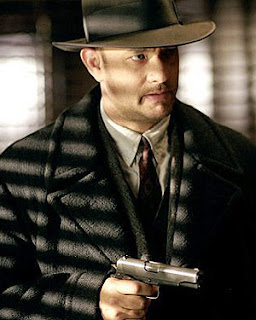 Revenge is “the action of inflicting hurt or harm on
someone for an injury or wrong suffered at their hands”. Rancour is “bitterness
or resentfulness, especially when long standing”. Throughout human history, these
two feelings have made millions of people suffer, be unhappy, and, the worst
thing, die. Road to Perdition, a film released in 2002, is a very good example
in which revenge, rancour and violence lead the main characters to a situation
of bitterness, fear, sadness or what is the same, to “perdition”.
Revenge is “the action of inflicting hurt or harm on
someone for an injury or wrong suffered at their hands”. Rancour is “bitterness
or resentfulness, especially when long standing”. Throughout human history, these
two feelings have made millions of people suffer, be unhappy, and, the worst
thing, die. Road to Perdition, a film released in 2002, is a very good example
in which revenge, rancour and violence lead the main characters to a situation
of bitterness, fear, sadness or what is the same, to “perdition”.
Michael Sullivan (Tom Hanks) is a hired gun who works
for John Rooney (Paul Newman), an Irish man who belongs to Al Capone in Chicago
and has brought up the orphan Michael. The biological son of Rooney is Connor (Daniel
Craig), a jealous and selfish man who hates Sullivan and always tries to
destroy him. One evening, gripped by curiosity, Michael’s son, Michael Jr.
(Tyler Hoechlin), hides in his father’s car and witnesses the murder of a man
at the hands of his father and Connor. After that, although the young boy
promises not to say a thing about what he has seen, Connor takes advantage of
the situation and tries to destroy the whole Sullivan’s family. However, he
only succeeds in killing Sullivan’s wife and little son. After finding his
family dead, Sullivan and his son get involved in a vicious circle of vengeance
and violence which will end in “perdition”.
Violence is one of the main topics of this film. In
the previous film we reviewed, violence was also an important matter but in
that case it was related to racism. Now violence is related to thirst for
revenge and rancour. Michael Sullivan is a hurt man who devotes his time to
make a lot of people pay the damaged they have caused to him and his family. In
the film, we learn that, after all, violence and weapons won’t take us anywhere
and that the only thing that revenge and rancour will give us is a broken and
sad life.
Another recurrent matter in this film is the
relationship between a father and his son. Michael Jr. is a young boy who loves
and admires his father. Sullivan is a busy man and, at the beginning of the
film, we can see that he doesn’t pay as much attention to his son as the little
boy would want him to. After all, their relationship becomes closer and
Sullivan realises that he has been wasting his time at working instead of
paying attention to his family.
To conclude, “Road to perdition” is a very good film
in which we learn that revenge and violence don’t lead us anywhere and that
sometimes we have to pay more attention to important things such as our family
or our friends because we don’t know how much time we’re going to have them.
Finally, I would like to highlight the end of the film in which Michael Jr.
says: “When people ask me if Michael Sullivan was a good man, or if there was
just no good in him at all, I always give the same answer. I just tell them...
he was my father”. I think this sentence is the best example of the love that
Michael Jr. and, I think, all of us have
for our father.





